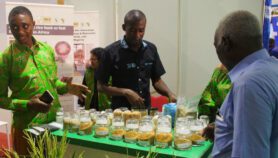By: T.V. Padma
Send to a friend
The details you provide on this page will not be used to send unsolicited email, and will not be sold to a 3rd party. See privacy policy.
[RIO DE JANEIRO] The impacts of urbanisation will be studied across the developing world using a new systems analysis approach that will consider inputs and data from multiple disciplines.
The International Council for Science (ICSU) plans to launch the ten-year initiative — which involves medium-sized cities of up to three million people — by 2013.
Currently, more than half the world's people live in cities, and the global urban population is increasing by about 1.5 per cent per year, according to the WHO.
Rapid urbanisation poses specific health challenges, particularly in developing countries, said Dov Jaron, a professor in the school of biomedical engineering, science and health systems, at Drexel University, United States, and an ICSU executive board member.
This article is part of our coverage of the Forum on Science, Technology and Innovation for Sustainable Development — the ICSU-led conference that is taking place on 11-15 June 2012, and looking at science and policy before Rio+20
The major threats to public health — such as heart disease, diabetes and cancers — arise from a combination of behavioural, economic and social factors, all of which interact with biological risk factors, Jaron said.
Interactions between these multiple factors do not have a simple linear relationship, and continue "over a lifespan across multiple scales and settings", he added.
Jaron told the Forum on Science, Technology and Innovation for Sustainable Development, which is underway in Rio de Janeiro, Brazil, yesterday (13 June) that a systems analysis approach that studies interactions between contributing individual factors, would be ideal to tackle such challenges.
"Separate analysis of individual factors is insufficient for addressing or predicting the output of complex problems," he told the conference.
But Olive Sishana, president of the International Social Science Council, South Africa, warned that while it was necessary to adopt a systems analysis approach, it was important to be cautious about the validity of the information fed into the model.
Science and social disciplines adopt different methods for research and data gathering, and it often becomes difficult to reconcile opposing views on the validity of their respective methods, she said.
The ICSU programme will include multi-disciplinary teams of natural and biomedical scientists, social scientists, engineers, and urban planners. It will also include policymakers as part of the programme, he said.
Indira Nath, emeritus professor at the National Institute of Pathology in New Delhi, India, told SciDev.Net that a host country for the programme would be chosen at a meeting in New Delhi in December, after which a call for research project proposals would be issued.
This article is part of our news coverage of the Forum on Science, Technology and Innovation for Sustainable Development. Read more in our live blog.













